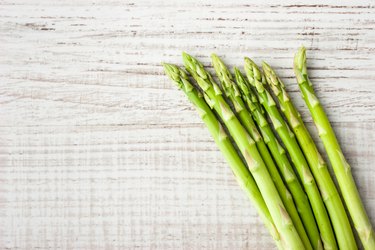
Contrary to popular belief, the list of foods to avoid with gout includes barely any vegetables. In fact, people with gout are encouraged to consume a wide variety of most vegetables. In general, the diet that is best for gout patients is one that is low in purine.
Tip
There are very few vegetables that people with gout should avoid since veggies tend to be low in purines. However, there are some vegetables — spinach, cauliflower, asparagus, beetroot, okra and mushrooms — that should be consumed in moderation.
Video of the Day
According to the American Academy of Family Physicians, purines are natural substances that create a waste product called uric acid when purine-rich foods are digested. Uric acid is linked to kidney stones, arthritis and gout.
Video of the Day
High-purine foods include red meat, most seafood and high-fat dairy products. These should be avoided, but moderate-purine foods like poultry, legumes and some vegetables can be eaten in moderation. People with gout are encouraged to consume an abundance of these low-purine foods: most vegetables, nuts, oils, fruit and whole grains.
Vegetables Like Beetroot and Gout
Most vegetables fall into the low-purine category, so vegetables are not usually on the list of foods to avoid with gout. However, there are a few vegetables containing a moderate amount of purines that people with gout should be aware of.
According to the American Academy of Family Physicians, moderate-purine vegetables include:
- Asparagus
- Spinach
- Cauliflower
- Mushrooms
Simply because these vegetables contain moderate amounts of purines does not mean that people with gout should avoid them altogether. According to Mayo Clinic, the purines in vegetables do not increase the risk of gout or recurring gout attacks.
Similar to purines, oxalates are another type of natural substance that increases the uric acid content in the body. Vegetable sources of oxalates include rhubarb, turnips, beets and okra. This is why there is speculation of a negative association between beetroot and gout. Since beets contain oxalates, beetroot and gout may not not be a good combination. The same is true of okra. Though it has many health benefits, it is not true that okra is good for gout.
If you have gout, you may choose to consume or avoid vegetables that contain purines and oxalates.
Read more: List of Foods That Raise Uric Acid
Vegetables Cooked in Animal Products
Similar to how you might think okra is good for gout simply because it is a vegetable, you might assume animal products are good for gout because they are sources of protein. However, there is a reason why many animal products fall into the list of foods to avoid with gout: they are high in purines and animal fat. While some animal products are allowed — such as low-fat dairy products, poultry and some seafood — many high-fat animal products are to be avoided on a diet to reduce gout.
Vegetables cooked in animal products may have higher purine content, which can lead to more uric acid in the body. According to Cleveland Clinic, high uric acid levels can also be attributed to genetics. If the increased risk of gout is hereditary, they still recommend adopting a healthy diet.
Avoid cooking vegetables in the following animal products:
- High-fat butter
- Cream
- Lard
- Grease
- Gravy
- Fish sauce
For example, mashed potatoes and gravy are a popular combination. While potatoes themselves are compliant on a gout-reducing diet, potatoes doused in gravy are not. Many people also consume vegetables cooked in butter or grease, which are both discouraged. If you have gout, season your vegetables with herbs, spices and other low-fat sources of flavor.
According to Mayo Clinic, high-fat animal products are limited because of their saturated fat content. While fats are important for overall health, people with gout should stick to sources of healthy dietary fats and avoid consuming too much saturated fat.
Read more: Vegetables High in Purines
Best Foods for Gout
The best foods for gout include lean proteins, healthy sources of dietary fat and plenty of complex carbohydrates. Not surprisingly, most vegetables fall into the last category.
The relationship between certain vegetables like beetroot and gout is unclear. Another example is whether okra is good for gout. If you have gout, you may want to consume these vegetables in moderation. Fortunately, there are thousands of vegetables to choose from, so limiting just a few of them is not as restrictive as it sounds.
There are some vegetables that people with gout may not want to eat too often, but the main takeaway is to reduce certain animal products and increase other foods that can limit gout flare ups: nuts, fruits, whole grains and vegetables.
Was this article helpful?
150 Characters Max
0/150
Thank you for sharing!
Thank you for your feedback!